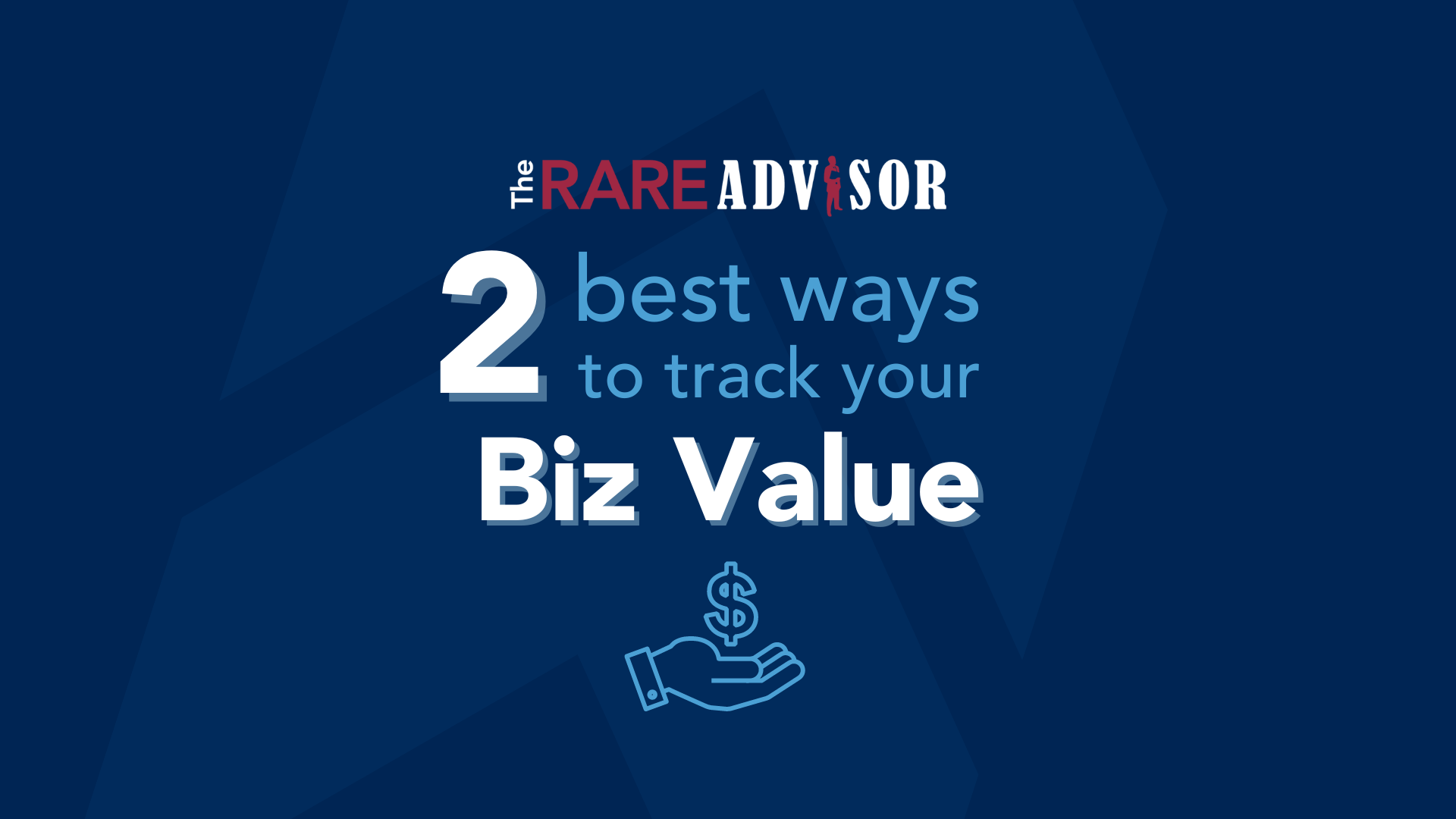The RARE Advisor: Two of the Best Ways to Track Your Business Value

They’re the things an outside investor would look at, and they’re also the same things that you should look at. In this episode of The RARE Advisor, we’ll talk about the two best ways to track your business value and the growth of your company.
Do you know the Blue Book value of your practice? I think it's something you should track on a regular basis.
We actually provide it quarterly for the advisors who work with USA Financial. Because we have so much data on their production and their business, we're able to actually create a Blue Book Valuation for them automatically on a quarterly basis. But if you don't have that privilege at your fingertips, you can reach out to USA Financial and we'll help you identify your Blue Book value. We have a tool that we've created that will calculate it for you. It's very similar to the Blue Book value on your vehicle in that it's designed to get you into the ballpark without having to do a full-blown appraisal. We normally find that we are within 1-3% of a full blown appraisal by simply executing a Blue Book calculation on an advisory practice. It's very powerful and very accurate. I encourage you to look at your Blue Book value on a quarterly basis as if it's your stock value, because it basically is - you're not a publicly traded company, so you don't have the ability to go and look at your stock price to see what your operation is being valued at. But this allows you to essentially do that. Some advisors use it for their own personal goals and growth, some use it for their corporate team to identify goals and growth. I think it's a great way to to build your business in the right way rather than just having sales goals and new client goals. Not that there's anything wrong with those things, but what really matters is that you are building the value of the business and this will help you track that.
Additionally, you're going to want to look at your EBITDA (earnings before interest, taxes, depreciation and, amortization). So kind of your net income, but EBITDA is the correct terminology. If you're not familiar with that, your accountant will be. Or you can search online to see how it all works. In a financial advisory practice, you should be coming in between 25-30% dividend. If you're below that, then you need to look at how you have your business structured. Now, I know that many advisors have basically no EBITDA, because they don't pay themselves on a regular basis. They get to the end of a month or the end of a quarter and they pull the money out of the practice, almost like it's a commission if you will, or a bonus, and they just kind of operate based on "what's left over goes to the owner". And that's okay, there's nothing wrong with that. But within that you should still have a shadow EBITDA that you're able to calculate to know that "hey, if I took X amount out, if I'm paid X and everybody else has now been paid, then here's my 25-30% EBITDA that I'm wanting to stay within that range".
If you are looking to get value on your practice, that's important. If you're looking to have a merger, an acquisition, a succession, or a transition at some stage, that's important. If you're looking to establish a lending relationship, that's important. So you do want to track these two things:
- Track the Blue Book value of your practice, because it's quick and it's easy. And there's really no better way to get a very quick view of what the business is worth to you.
- Track your EBITDA either in real life or as a shadow EBITDA so that you know how your practice is being valued as an actual business.
--
The RARE Advisor is a business model supercharged by Recurring And Repeatable Events. With more than thirty years of working with and coaching successful advisors, host Mike Walters (along with other leaders in the industry), discusses what it takes to grow a successful practice. With the aim of helping financial professionals and financial advisors take their business to the next level, Mike Walters shares insights and success stories that make a real impact. Regardless of the stage of your practice, The RARE Advisor will provide thoughtful guidance, suggestions for developing systems and processes that work, and ideas for creating an authentic experience for your clients.
The RARE Advisor is also a podcast! Subscribe today via Apple Podcasts, Google Podcasts, or your preferred podcast listening service for easier on-the-go listening.
Author Info

Mike Walters is the Chief Executive Officer (CEO) of USA Financial, leading the firm since its inception in 1988. Mike is committed to...
Related Posts

The Psychology Behind Your CTA: Why Prospects Don’t Click “Book a Call”
In this episode of Financial Advisor Marketing Playbook, Mark Mersman breaks down the real psychological barriers that stop prospects from clicking “book a call” on an advisor’s website—and how small language and design changes can dramatically improve conversions. You’ll learn practical, compliant fixes including softer CTA language, expectation statements, empathy‑based messaging, simplified design, and reassurance techniques that lower emotional friction. If you want a website that encourages prospects to take the first step confidently, this episode delivers actionable guidance advisors can implement immediately.

How Advisors Can Get 10 Hours Back Every Week
In this episode of The RARE Advisor, host Aaron Grady and USA Financial Pareto coach and Practice Management Consultant Allan Oehrlein dive into time allocation as a core lever for advisory success. They unpack the biggest time drains—email, unsolicited calls, and open-door interruptions—and lay out a practical framework for calendar rebalancing that starts with personal time, management time, client appointments, dedicated communications windows, “work on the business” time, and high-impact growth activities. With real-world stories showing how advisors shift from reactive days to structured weeks (and even reclaim Fridays), Aaron and Allan share easy-to-implement tips: color coding calendars, scheduling buffers, daily huddles, and call/appointment protocols. If you’re ready to audit your calendar, define your ideal week, and create structure that truly liberates your practice, this conversation is your next step.

What Billion-Dollar Brands Teach Advisors About Client Loyalty
In this episode of the Financial Advisor Marketing Playbook, Mark Mersman explores what billion-dollar consumer brands like Peloton, Apple, Airbnb, Disney, and Starbucks understand about loyalty—and how financial advisors can apply these lessons to their own practices. Discover why loyalty is emotional, not transactional, and learn practical strategies to create belonging, simplify your process, showcase identity, design unforgettable experiences, and personalize client interactions. Tune in to transform your value proposition and build a community your clients never want to leave.

The Psychology Behind Your CTA: Why Prospects Don’t Click “Book a Call”
In this episode of Financial Advisor Marketing Playbook, Mark Mersman breaks down the real psychological barriers that stop prospects from clicking “book a call” on an advisor’s website—and how small language and design changes can dramatically improve conversions. You’ll learn practical, compliant fixes including softer CTA language, expectation statements, empathy‑based messaging, simplified design, and reassurance techniques that lower emotional friction. If you want a website that encourages prospects to take the first step confidently, this episode delivers actionable guidance advisors can implement immediately.

How Advisors Can Get 10 Hours Back Every Week
In this episode of The RARE Advisor, host Aaron Grady and USA Financial Pareto coach and Practice Management Consultant Allan Oehrlein dive into time allocation as a core lever for advisory success. They unpack the biggest time drains—email, unsolicited calls, and open-door interruptions—and lay out a practical framework for calendar rebalancing that starts with personal time, management time, client appointments, dedicated communications windows, “work on the business” time, and high-impact growth activities. With real-world stories showing how advisors shift from reactive days to structured weeks (and even reclaim Fridays), Aaron and Allan share easy-to-implement tips: color coding calendars, scheduling buffers, daily huddles, and call/appointment protocols. If you’re ready to audit your calendar, define your ideal week, and create structure that truly liberates your practice, this conversation is your next step.

What Billion-Dollar Brands Teach Advisors About Client Loyalty
In this episode of the Financial Advisor Marketing Playbook, Mark Mersman explores what billion-dollar consumer brands like Peloton, Apple, Airbnb, Disney, and Starbucks understand about loyalty—and how financial advisors can apply these lessons to their own practices. Discover why loyalty is emotional, not transactional, and learn practical strategies to create belonging, simplify your process, showcase identity, design unforgettable experiences, and personalize client interactions. Tune in to transform your value proposition and build a community your clients never want to leave.

